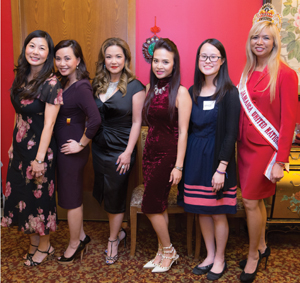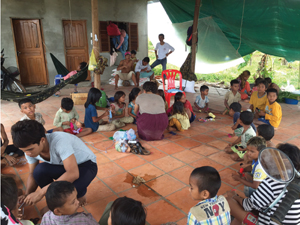Posted on Jan 31, 2016 in
FEATURES

Terri Wang, Pauline Phan Ung, Dianne Bui Dao, Anita Thao Ly, Maggie Wong and Peta-gay Chen Ledbetter supporting fundraising for Cambodia.
By Zeenat Kassam Mitha –
Fort Bend residents from Cambodia celebrate Independence Day for Cambodia each year on January 7th. Cambodians rejoice in this independence as of 1979 with family and friends over food and sharing of history, but it is also a memorial for Cambodians as a reflection of those killed in the genocide from 1975 to 1979. Cambodian Americans also make this an opportunity to reflect on the current status of Cambodia and assist in fundraising for orphanages, schools and other immediate needs.
“We are happy for Independence Day, but between April 17, 1975 and January 7, 1979, over two million innocent Cambodians were killed by means of starvation, harsh labor or buried alive,” said Fort Bend resident Leng Abbassi. Cambodia is scarred today, leaving approximately 75 percent of unskilled women to be head of their families, and children must work to make extra money to feed themselves.
“Some still live in hut homes with a roof or walls of dried coconut tree leaves and dirt floors, and many young children must work each day,” said Brooke Wallace, a Cambodian American assisting in fundraising. In the villages and suburbs of Cambodia, people still live without electricity and clean water. “Also, sadly, young girls are being sold as sex slaves for as little as $100 because their family cannot afford to feed them,” stated Abbassi.

Children at the Kampot Orphans House in Cambodia.
A little bit of history was shared with the group as a reminder to those celebrating Cambodia’s Independence. On January 10, 1979, after the Vietnamese army and the Kampuchean United Front for National Salvation (KUFNS) invaded Cambodia and overthrew the Khmer Rouge, the New People’s Republic of Kampuchea (PRK) was established with Heng Samrin as head of state. The Khmer Rouge forces retreated rapidly to the jungles near the Thai border. The Khmer Rouge and the PRK began a costly battle that played into the hands of the larger powers: China, the United States and the Soviet Union.
The Khmer People’s Revolutionary Party’s rule gave rise to a guerrilla movement of three major resistance groups – the Front Uni National pour un Cambodge Indépendant, Neutre, Pacifique, et Coopératif (FUNCINPEC), the Khmer People’s National Liberation Front (KPLNF) and the Party of Democratic Kampuchea (PDK), the Khmer Rouge under the nominal presidency of Khieu Samphan. The civil war displaced approximately 600,000 Cambodians, who fled to refugee camps along the border to Thailand, along with tens of thousands of people who were murdered throughout the country. That explains why the country and the people of Cambodia need assistance today with the situations they are facing.
“There is a very serious need to assist in the fundraising for women and children and an orphanage,” said Terri Wang, Fort Bend resident and supporter of the Abbassi Foundation.
Fort Bend resident Leng Abbassi fled Cambodia in April 1975 on a cargo airplane. Her life was spared, and so were the lives of 22 family members who escaped with her on that flight. She returned to her native home in 2011 and started a sewing project, which intended to rescue the poor and young women at risk of being sex slaves by giving them a skill for life. The project has expanded to teaching children English and other activities.
In 2015, the Abbassi Foundation embraced a new challenge of building an orphanage and village school in Leng Abbassi’s hometown of Kampot, Cambodia. In Kampot, people still live in tree-leaf houses and have no running water or electricity. “Our goal is to bring a promising future to the children, women and families through education, skills and inspiration,” stated Abbassi.
To volunteer or learn more about the Abbassi Foundation, contact Terri Wang at terri@rocketmail.com.
 To share your ideas for upcoming cultural stories and events, contact Cultural Correspondent Zeenat Kassam Mitha at zeenat@absolutelyfocusmedia.com
To share your ideas for upcoming cultural stories and events, contact Cultural Correspondent Zeenat Kassam Mitha at zeenat@absolutelyfocusmedia.com















